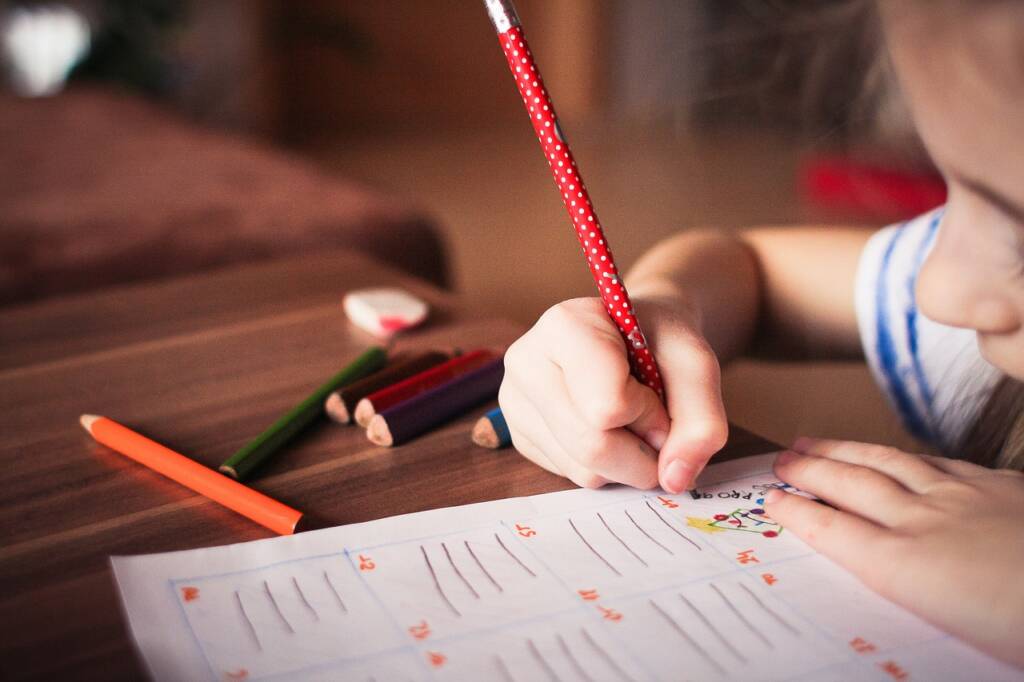
Elementary Language Arts Grade 2

The Elementary English Language Arts Grade Two course provides students with foundational reading and writing skills, reading comprehension strategies, writing composition and grammar skills, and speaking and listening skills. Students will learn how to use a combination of short and long vowel sounds, r-control vowels, and other vowel combinations in conjunction with consonant digraphs, blends, and endings to decode and encode words when reading and writing. Students will be taught grammar skills, such as collective and irregular nouns, irregular verbs, subject and predicate, and adverbs, which they will incorporate when writing. Students will participate in planning, writing, editing, revising, and publishing informative, narrative, and opinion writing compositions throughout the course.
Please view the Elementary Parents Guide for Grades K-2 with guidance on helping your student transition to online learning and thrive at VLACS.
Major Topics and Concepts
Segment One
- Consonant blends with a short vowel
- Long vowels
- Digraphs
- Silent letters
- Compound words
- Asking and answering questions in a text
- Character’s response to events
- Rhyme, rhythm, and beat in a literature text
- Central message and key details
- Making connections
- Identifying the main topic and key details
- Using context clues to determine unknown words in text
- Story structure
- Point of view
- Author’s purpose
- Text features
- Images add meaning to text
- Identifying adjectives, rhyme, alliteration, rhythm, and beat in a literature
- Comparing and contrasting
- Reading grade-level sight words
- Reading grade-level texts for accuracy, rate, fluency, and expression
- Using context clues
- Nouns: singular, plural, collective, and irregular plural
- Pronouns
- Irregular verbs
- Subject and predicate
- Complete and incomplete sentences
- Types of sentences
- Using a dictionary
- Using a glossary
- Capitalization: holidays, products, and geographic names
- Prefixes
- Suffixes
- Verb tense: past, present, and future tense
- Comparative adjectives
- Adverbs
- Compound sentences
- Contractions
- Informative, narrative, or opinion writing on a topic
- Writing Process
Segment Two
- Long vowel sounds
- Diphthongs
- Schwa sound
- Words with irregular sounds
- Sounds in blends
- Triple clusters
- Compound words
- Contractions
- Prefixes and suffixes
- Asking and answering questions
- Identifying central message and key details
- Recounting details in a story
- Story elements
- Making connections
- Point of view
- Character’s response to events
- Main topic and key details
- Re-reading to find information in a text
- Images add meaning to text
- Comparing and contrasting
- Identifying rhythm and rhyme in a literature text
- Author’s point
- Character reactions and responses in a literature text
- Cause and effect in a literature text
- Alliteration
- Reading grade-level sight words
- Reading grade-level texts for accuracy, rate, fluency, and expression
- Shades of meaning
- Possessive nouns
- Compound sentences
- Using a dictionary
- Using a glossary
- Researching and writing on a given topic
- Using commas correctly when writing
- Parts of a letter
- Root words and suffixes
- Adding adjectives and adverbs to writing
- Using formal and informal language
- Informative, narrative, or opinion writing on a topic
- Writing Process
Course Materials
To achieve success, students are expected to submit work in each course weekly. Students can learn at their own pace; however, “any pace” still means that students must make progress in the course every week. To measure learning, students complete self-checks, practice lessons, multiple choice questions, projects, discussion-based assessments, and discussions. Students and families are expected to maintain regular contact with teachers because, when teachers, students, and parents work together, students are successful.
Required Materials – Please view the list of materials before registering.
Competencies
Expository Paragraph
I can explain the author's purpose in a text. I can identify the key details of a text. I can create verbs in past, present, and future tense. I can write an expository paragraph with a topic sentence, supporting details, and closing sentence. I can explain the importance of planning in the writing process.
Multi-Paragraph Expository Writing
I can explain the use of text features to add purpose to a text. I can explain an author’s opinion in a text. I can explain figurative language in a text. I can write compound sentences. I can write a multi-paragraph expository response.
Multi-Paragraph Opinion Writing
I can explain the evidence used to support the author’s opinion. I can retell an informational text using the central idea and key details. I can explain the use of apostrophes to form contractions. I can write a multi-paragraph opinion text using a structure.
Opinion Paragraph
I can identify the rhyme scheme in a poem. I can identify similes, idioms, and alliteration in a text. I can write complete sentences with correct punctuation. I can write an opinion paragraph using reasons and examples.
Structure of a Narrative
I can identify elements of a story. I can identify the theme of a story. I can create plural nouns. I can develop strategies to determine the meaning of unknown words. I can write a narrative following a structure.
Multi-Paragraph Narrative Writing
I can explain characters’ points of view. I can compare the story elements in two stories. I can write adjectives and adverbs to expand sentences. I can write a fictional narrative with multiple paragraphs.
Expository Research Project
I can explain the process of using a base word and suffix to determine the meaning of a word. I can identify consistent verb tense. I can write a research article using facts from two different articles to answer my question. I can identify the sources I used for a research project.
Life Lessons in a Narrative
I can retell a story using story elements in a logical sequence. I can explain the theme of a story. I can identify prepositions and prepositional phrases. I can write a personal narrative with a lesson. I can write dialogue using quotation marks.
Multimedia Narrative Storybook
I can explain the role of a prefix in changing the meaning of a word. I can differentiate between two stories on the same topic. I can identify progressive verb tense. I can create a narrative storybook with a clear sequence of events. I can create a multimedia element to enhance the meaning of my writing. I can read a text aloud using speaking skills.
Opinion Letter
I can identify the correct use of commas in a sentence or phrase. I can write a formal letter that conveys my opinion. I can explain the importance of revising and editing.
6988 Research-Based Expository Writing
I can compare information from two texts on the same topic. I can explain the use of reference materials to determine the meaning of unknown words. I can write possessive nouns. I can write a response to a question based on my research. I can revise my work by applying feedback.
Research-Based Opinion
I can identify base words and affixes. I can explain the role of a suffix in changing the meaning of a word. I can categorize the elements of a text based on similarities and differences. I can identify perfect verb tense. I can write an opinion based on research. I can summarize the writing process.

